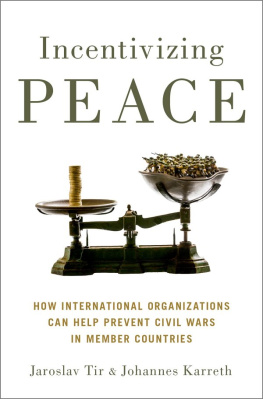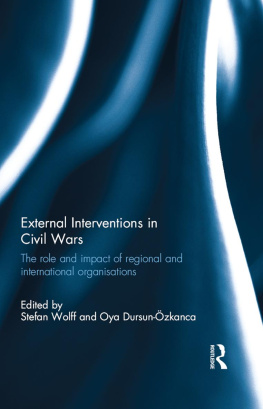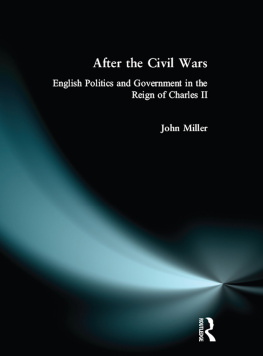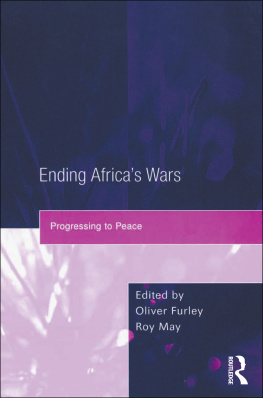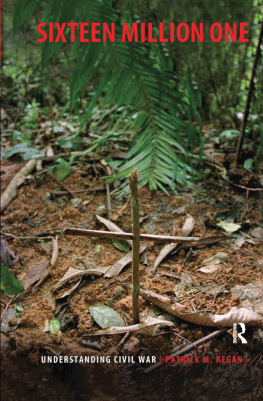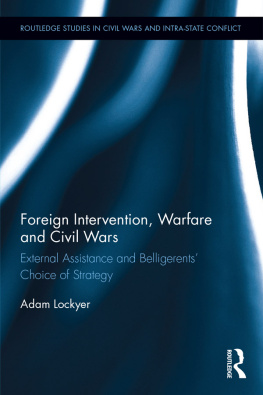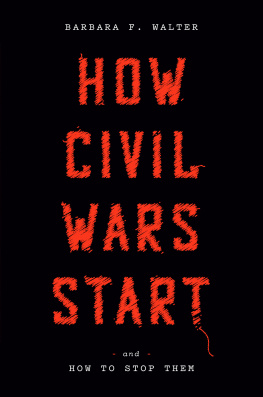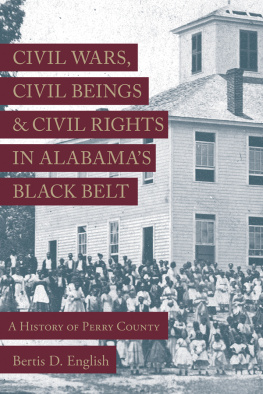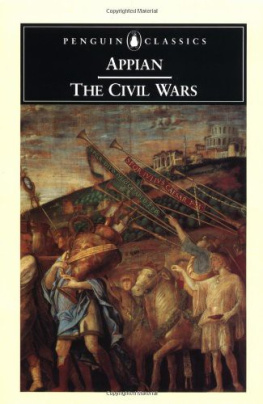Incentivizing Peace

Oxford University Press is a department of the University of Oxford. It furthers the Universitys objective of excellence in research, scholarship, and education by publishing worldwide. Oxford is a registered trade mark of Oxford University Press in the UK and in certain other countries.
Published in the United States of America by Oxford University Press
198 Madison Avenue, New York, NY 10016, United States of America.
Oxford University Press 2018
All rights reserved. No part of this publication may be reproduced, stored in a retrieval system, or transmitted, in any form or by any means, without the prior permission in writing of Oxford University Press, or as expressly permitted by law, by license, or under terms agreed with the appropriate reproduction rights organization. Inquiries concerning reproduction outside the scope of the above should be sent to the Rights Department, Oxford University Press, at the address above.
You must not circulate this work in any other form and you must impose this same condition on any acquirer.
Library of Congress Cataloging-in-Publication Data
Names: Tir, Jaroslav, 1972- author. | Karreth, Johannes, author.
Title: Incentivizing peace : how international organizations can help prevent civil wars
in member countries / Jaroslav Tir and Johannes Karreth.
Description: New York, NY : Oxford University Press, [2018] | Includes bibliographical references.
Identifiers: LCCN 2017026625 (print) | LCCN 2017052236 (ebook) | ISBN 9780190699543 (epub) |
ISBN 9780190699536 (updf) | ISBN 9780190699512 (hardcover) | ISBN 9780190699529 (pbk.)
Subjects: LCSH: International agenciesMembership. |
Peace-buildingInternational cooperation. |
Conflict managementInternational cooperation. | Civil warPrevention.
Classification: LCC JZ4850 (ebook) |
LCC JZ4850.T57 2018 (print) | DDC 303.6/4dc23
LC record available at https://lccn.loc.gov/2017026625
CONTENTS
LIST OF FIGURES
LIST OF TABLES
ACKNOWLEDGMENTS
This book has grown out of a long-term collaborative project between the authors. Along the way, several colleagues and friends have generously provided feedback and offered helpful thoughts on our work. For their comments on the manuscript along its different stages, we thank Kyle Beardsley, Ken Bickers, Margit Bussmann, Courtenay Conrad, Paul Diehl, Bryan Early, Page Fortna, Michael Greig, Hvard Hegre, Ann Karreth, Carmela Lutmar, Helen Milner, Sara Mitchell, Glenn Palmer, Burcu Savun, Carolyn Tir, and Geoffrey Wallace. John Vasquez, Patrick James, Paul Diehl, and Matthew Ingram provided advice and guidance in developing and placing the book manuscript.
At Oxford University Press, we are grateful to David McBride for his editorial guidance. The feedback from two anonymous reviewers greatly improved the manuscript. We also thank Emily Mackenzie, Ed Robinson, Claire Sibley, and Kathleen Weaver for their assistance during the production of this book and Susan McClung for copy-editing our manuscript.
In facilitating this research, we have benefited from institutional support from the Departments of Political Science at the University of Colorado Boulder and the University at Albany, the Department of Politics and International Relations at Ursinus College, and the Kroc Institute for International Peace Studies at the University of Notre Dame. For research assistance, we thank Steven Beard, Cori Cichowicz, Timothy Passmore, Elisa Elvove, and Charmaine Willis. We also owe a debt of gratitude to the scholars and researchers who collected and made publicly available the data we use throughout this book.
The authors contributed equally and interactively to this book. This book is one of several outputs of a joint project, and the order of their names follows a principle of rotation.
Incentivizing Peace
Civil wars are one of the most pressing problems facing the world today. Beyond causing millions of casualties and immeasurable human suffering in the postWorld War II era,
These and other consequences of civil wars are in part responsible for setting the stage for future civil wars. Nearly 50 percent of civil wars return to violence within five years of the initial cessation of hostilities.
Given the
Yet, despite some successes, the sad fact remains that civil wars continue to occur, and recur, to this day with notable regularity. in robust, decisive conflict management efforts or because they did not supply any meaningful conflict management at all.
Multilateral peacekeeping missions in particular are deployed to only about one-third of civil wars. such selective deployment of peacekeeping efforts is one of the reasons why civil wars persist today.
Questions of bias favoring the interests of sending states as opposed to civil-war states are even more prominent in the case of militarized interventions. In these cases, intervening states generally aim to protect or advance their economic or strategic interests and to make sure that their further amplifying the negative long-term consequences of civil wars noted previously.
International mediators are closest to being truly neutral actors who have the interests of the civil-war state and its population at the forefront
In short, despite many conflict management successes, scholars and practitioners understanding of how to manage civil wars can still be substantially improved. With a better understanding of how to use existing international structures effectively to mitigate civil wars, countries facing high risks of political violence could improve their odds for domestic peace and stability. Addressing this issue and highlighting a potential solution are the subjects of this book. We preview this approach and our argument next.
As the previous discussion suggests, the international community has had only limited success in managing civil wars. For that reason, we argue for the In contrast, the threshold of a conflicts escalation to a full-scale civil war is usually reached within 12 months after hostilities began. These temporal patterns suggest that a reorientation toward preventing armed conflict escalation is both necessary and potentially fruitful. Nevertheless, third-party involvement in nascent, precivil war conflicts has received only scant scholarly attention.
To be sure, much work by scholars and practitioners has focused on the role of third parties in preventing conflict by improving structural conditions. Many of these efforts focus on development assistance and institution-building.
We therefore focus on the early stages of domestic armed conflicts in this discussion. In a typical scenario, civil wars start as relatively small clashes between the government and a domestic opposition: that is, minorities, political movements, or other insurgent groups, calculations can be changed to favor a peaceful resolution.
We argue that certain international third parties can help change these calculations early in the conflict. The answer, however, is unfortunately less straightforward than merely urging that mediation, peacekeeping, or intervention efforts take place sooner. As we explain in the next chapter, these approaches are a poor fit for civil Due to this problem and both actors anticipation of it, peace deals are often difficult to achieve at the early stage of low-level armed conflicts. Conflict parties may fail to sign them, or they may not proceed with their implementation. That is, if signed, agreements often unravel before peace stabilizes.

